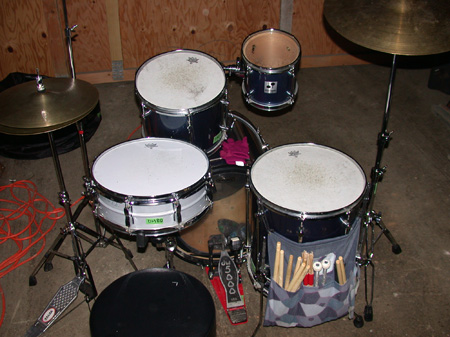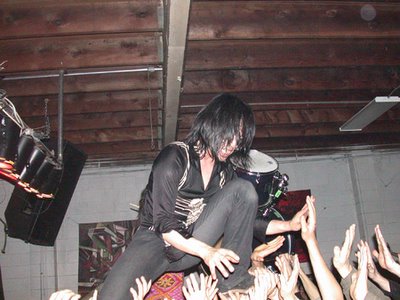Talking jazz history with McCoy Tyner

Looking back on the history of modern jazz, is hard to find a band as influential as the John Coltrane Quartet, circa 1960, the forward thinking sax player backed by an amazing rhythm section: Elvin Jones on drums, Jimmy Garrison on bass, and on piano, a young McCoy Tyner, just 20 years old when he joined.
He’s older and wiser now, and he’s still playing jazz. A the end of January he was on the West Coast doing his annual residency at Yoshi’s including a week playing with John’s son, Ravi Coltrane. This Saturday, Feb. 18, Tyner plays for the first time in Arcata, leading a trio with drummer Eric Gravatt and bassist Charnett Moffett who played with him at Yoshi’s.
On Valentine’s Day morning, Tyner called from his home in New York City, Manhattan to be exact. “I’m originally from Philadelphia,” he began, “I came here a long time ago when I started working with Coltrane; I worked with him for years.”
When you were growing up in Philadelphia, was the some point when you decided, I’m going to be a musician?
My mother asked me what I wanted to do. When I was in elementary school and junior high school I was always in musicals and plays, but I wasn’t playing music. There was a gentleman who taught kids in my neighborhood; he was teaching the girl across the street. My mother asked, would I like to study with him? Would you like to take singing lessons or piano? I chose piano, thank goodness. That’s how I got started. I was 13 then.
That would have been the early ’50s?
That’s right. I was born in 1938.
What kind of music did you learn back then?
You know when you begin; you start with scales and have these little songs in songbooks. Then I went to another teacher who took me through Bach and Beethoven, the European classics. It was the regular stuff that people study when they study piano.
And you went to music school?
Yes. West Philadelphia Music Center and Granoff Music School.
And that was while you were still a teenager?
Right.
What was the music being played outside of the school setting back then?
Well, I started an R&B band, a seven-piece band. We used to play kind of house-rockin’ R&B kind of music. Then some older musicians heard me and they said, well you should learn this Bud Powell song or a Charlie Parker song, you know the jazz kind of thing. That was great because I started making gigs with them. They saw early on that that was what I was going to do, what I was meant to do.
You were meant to play jazz…
Right, but I started out with R&B like I said.
When you say R&B…
Rhythm and blues…
…you’re talking about post-swing era, pre-rock…
“Flyin’ Home” things like that. We just called it house-rockin’.
What was the difference between that and jazz of the time?
Well I think a lot of the jazz artists started out playing that music, and playing with blues singers, people who sang that style — they had a lot of gigs. So I started playing with singers along with horn players who were playing the clubs. I’d put my age up when I used to go to Atlantic City and play there during the summer. I was 15 or 16 years old, but I’d tell them I was older, that I was 18. (laughs)
When you made the transition into playing what you call “jazz,” what was the difference?
Was it a different audience, people who were coming to listen rather than just to dance?
You’re missing your history. Jazz players used to play for dancers: When I was starting, they were dancing; we played places where they could dance — to bebop. The two went hand-in-hand in the early days.
Was there a time when it became, I don’t know, more intellectualized, where you’d be playing in nightclubs where everyone would just be sitting there listening?
Well yeah, that also existed, but we also played for dancers. You don’t see that so much today as you did then. But people would dance to Charlie Parker songs when I was growing up. We had a place called Red House Hall that was a dance club. And sure we played where people were sitting down, but there weren’t many places where dancing was absent.
What about this place called the Red Rooster?
It was more of a bar, a sit down and listen kind of place. People started doing that: sitting down and listening. That was a trend even before I started playing in clubs.
Did you play differently when people were sitting and listening? Did it shift your mindset?
Not at all. You don’t focus on the public like that. I don’t. Whatever I play, that’s my offering. You either listen to it or you don’t. That’s all. I don’t change my style because of the public worrying about whether they like it or not.
How did you meet John Coltrane?
How? I just told him I was ready to play in my own band. I’d been playing with Benny Golson, going out with him before they formed the Jazztet. I worked with them for a while, but I’d made a verbal commitment to John, that whenever he left Miles Davis, I would join his band.
It’s obvious joining the Coltrane Quartet was a turning point in your life…
And in the jazz period…
What did you learn playing in the group?
Well I learned a lot for John. He was such a major figure in the music. His style was being copied and eventually the whole quartet, Elvin Jones, Jimmy [Garrison] and myself, other people were listening to us and trying to sound like we sounded, trying to copy the whole group thing. I learned so much, it was like going to school because John was my senior of course, 12 years older than me and you know. Elvin was older, what have you.
How old were you then?
I was 17 when I met John; I joined his band when I was 20, something like that. Met him when he was still with Miles. He’d come though; he had family in Philly. He was like a big brother to me. I was so young when I met him.
I know it’s hard to explain, but can you verbalize what it was that shifted in jazz because of that group?
The style of playing changed. The concept. It’s hard to be detailed about it, you have to listen and make that assessment yourself. I don’t know that I can analyze my style with words. What can I say? I don’t do that. I’m doing this; I’m doing that. I just do it. It’s better for someone else to define it. Except, first of all, I really enjoyed accompanying him, the way I comped it, comped behind him. I don’t know, it was a style that just developed. John grew up playing the same kind of gigs that I used to play, of course he was a lot older than me, but he came from something similar. But he was always a progressive thinker, thinking ahead, practicing consistently — always practicing, always working on something. Again, he was alike a teacher. I learned a lot from accompanying him.
And the shift in jazz?
It was a very natural movement from one phase to another.
So following his lead brought you to new places…
That’s right. And he chose members of his band, the quartet, who he thought could accommodate the music.
I’d say he chose well.
He did. (laughs)
After going through that experience for a few years, did you keep exploring?
After I left the band? It was different. Of course I was always interested in doing what I wanted to do on a personal level. I started recording under my own name, even when I was with John, but you know, coming from such an influential group it was easy to develop my own band and do my own thing with a trio.
I know you got into African music with albums like Sahara…
I studied all sorts of music. I really liked Latin music, which had the African influence as well because of the conga drums. I kind of messed with that, playing congas for a while, but it started hurting my hands so I put it down. I wasn’t that good, just playing jam sessions. You have to be careful or you can really damage your hands.
I read somewhere that some time over the years you played in Ike and Tina Turner’s band. [It was in McCoy’s bio at AllMusic.com.]
That’s not true. You know why people say that? Azar Lawrence was playing tenor sax with me a long time ago. He worked for Ike and Tina.
So some journalist got it wrong. It did not really make sense to me.
They did an interview with him and it got mixed up. I don’t know how you can do something that stupid. It got mixed up with my biography, I don’t know how. How the heck would they do that?
My guess would be some journalist didn’t hear things right or wrote it down wrong, and that was perpetuated because some other journalist read what he wrote and passed it on. The error then seems to be real.
Exactly, but it’s manufactured. (laughs)
Weren’t you just out here on the West Coast playing at Yoshi’s?
That’s right. I’ve been playing there off and on for 12 years. It’s developed to a point where now they want me to stay and play for two weeks and present different musicians so I have a different band each week. I’ve been doing that for a few years.
And you played with John’s son Ravi?
The first week was with Joe Lovano and Dave Holland. The second week was with Ravi Coltrane and Bobby Hutcherson. Bobby and I go way back.
Did you revisit some of the songs you played in the past?
We played some songs that Bobby and I recorded together.
Who’s coming out with you when you play here in Arcata?
Charnett Moffett (bass) and Eric Gravatt (drums), he used to play with Weather Report years ago.
Where having you been taking things musically? Are you exploring any new territory?
I try to do different things all the time, but I don’t really have a name for it. It’s a culmination of everything I’ve been through musically. I use it as a platform and try to have in catapult me to another level. But I’m not doing a John Coltrane kind of thing where I’m like looking all the time for something new. I use music as an experience. I don’t like to play the same thing every day, but I’m not on a mission. I just want to enjoy playing. And if I enjoy what I play, hopefully I’ll run into something very interesting. That’s all. I don’t try to practice every day trying to reach some certain point. You know I’ve done a lot of things and I don’t have to prove anything.














